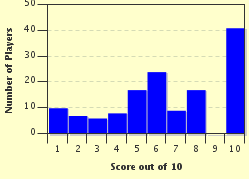
Matching Battles, Ancient and (Early) Modern Quiz
This is a companion piece to my previous quiz on matching modern battles. This one contains five questions about ancient Greek and Roman battles, and another five from the early modern period. As before, match the battle to the conflict.
A matching quiz
by Ampelos.
Estimated time: 4 mins.
